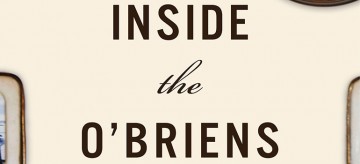 Lisa Genova is a wildly successful author whose first book, Still Alice, was recently adapted into an Oscar-winning film. While Genova was penning her third novel, Inside The O’Briens, she relied on the knowledge of Department of Psychiatry postdoctoral fellow Alicia Semaka to bring a story about Huntington’s disease to life. Semaka shares the story of how she ended up with an acknowledgement in a best-selling author’s book.
Lisa Genova is a wildly successful author whose first book, Still Alice, was recently adapted into an Oscar-winning film. While Genova was penning her third novel, Inside The O’Briens, she relied on the knowledge of Department of Psychiatry postdoctoral fellow Alicia Semaka to bring a story about Huntington’s disease to life. Semaka shares the story of how she ended up with an acknowledgement in a best-selling author’s book.

Alicia Semaka
How did you become a consultant on this book?
I have been a fan of Lisa Genova’s work since her first book, Still Alice. I read an interview in which she said she was working on a book about an inherited neurodegenerative disease and genetic fate. I was so excited because I just knew the book was going to be about Huntington disease (HD).
Given my background with HD, I felt compelled to reach out to her, so I tracked down her publicist and agent and offered to share my knowledge and experience with her. I have great respect and passion for the Huntington’s community, and if there was anything I could do to help make the book a true and authentic representation of their lived experience, I wanted to do it.
What was your role?
We had a few phone conversations and email exchanges over the course of a couple of years. I did my PhD on Huntington’s disease and I’ve worked with a lot of patients and families. I’m also a genetic counsellor so I have experience and knowledge around predictive testing.
While my rationale for reaching out to her was to share my experience and knowledge, truthfully, I never thought she would actually contact me. I think this just goes to show that if you have expertise in something, don’t be afraid to go out on a limb and offer to share it, because you never know what can happen. Who would have thought I’d contribute to a book by an international best-selling author?
Did you get to read any book drafts of Inside The O’Briens?
No, but I did receive an advance reader’s copy of the book. I think it’s a really accurate representation of the lived experience of Huntington’s disease—for both patients and families.
It’s fiction and written, of course, for entertainment. But I really feel she hit the nail on the head. In all her books she has the ability to really educate her reader and at the same time keeping them engaged in the story. I truly believe this book will do wonders in increasing awareness about HD, which is fantastic.
What are you working on now?
I’m now doing my post-doctoral fellowship, looking at genetic counselling for individuals that have serious mental illness.
Research has shown that despite not having clinically available genetic testing for mental illness, genetic counselling has a positive impact on patients’ lives. They have better treatment adherence, perceived management and control over their illness, and experience less stigma.
What I hope to find out is “why?” It’s a qualitative study where I interview people before and after they receive genetic counselling to try and determine how it’s helping them.